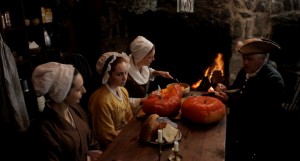Innocence: Improbable or Impossible?
 I always knew the character of Sarah Pine would be a bit of a risk. Our Producer Jonathan Wilson even wondered, on first read, whether she was “all there.” I explained that I saw her as a young woman obsessed with applied theology as a hobby, in a way we can’t quite imagine today this side of an Amish after glow service. If you haven’t spent much time in 18th century primary sources, it might be hard to acknowledge that published sermons were the social networking “links” of their day. Hanna Green Winslow, an 11 year old girl residing in Boston for “finishing,” kept a journal with sermon summaries that compare favorably with today’s post-doctoral religion blogs. Hanna summarized some of her Wednesday evening lecture notes as follows.
I always knew the character of Sarah Pine would be a bit of a risk. Our Producer Jonathan Wilson even wondered, on first read, whether she was “all there.” I explained that I saw her as a young woman obsessed with applied theology as a hobby, in a way we can’t quite imagine today this side of an Amish after glow service. If you haven’t spent much time in 18th century primary sources, it might be hard to acknowledge that published sermons were the social networking “links” of their day. Hanna Green Winslow, an 11 year old girl residing in Boston for “finishing,” kept a journal with sermon summaries that compare favorably with today’s post-doctoral religion blogs. Hanna summarized some of her Wednesday evening lecture notes as follows.
Ask yourself: Could your eleven year old, pen this:
Mr Hunt having taken his turn to show what the Scriptures principly teach, & what is God. I remember he said that there was nothing properly done without a rule, & he said that the rule God had given us to glorify him by was the bible. How miraculously (said he) has God preserv’d this blessed book. It was once in the reign of a heathen emperor condemn’d to be burnt, at which time it was death to have a bible & conceal it, but God’s providence was wonderful in preserving it when so much human policy had been exerted to bury it in Oblivion — but for all that, here we have it as pure & uncorrupted as ever — many books of human composure have had much pains taken to preserve ‘em, notwithstanding they are are buried in Oblivion..
Now, we never show Sarah Pine quite this carried away in homoletic summary, but alert readers will recognize that much of what Sarah says is just her embroidery (very literal embroidery) on Romans 13. She innocently believes God’s word — that “ministers of state” (magistrates, judges, soldiers) are only a “terror” to those who do “evil.” She refuses to believe that the man who promised to marry her will do any thing other than marry her, and that constitutes both her innocence and her heresy. A few spiritual “teachers” of the era held that the very act of consummation constituted marriage, based on their failure to document chapel marriage rituals in the old testament. Sarah, anxious to start life, believes this, against her better judgment, and perhaps in rebellion against the advice of her aunt.
So, Sarah, like all of us, is both learned and mis-directed, well-read but on the wrong path, both a victim and a ultimately a beneficiary of her extraordinary faith.
Alex Oliver, who played Sarah, understood this, even though I suspect her take on issues of faith may be substantially different from my own. (I’ve never had a conversation about faith with her.) Simply put, she executed flawlessly. When she puts the best face on Bob’s return to Courage township, (“you obeyed!”), I laughed at the nuttiness of this optimism, but that’s exactly how I saw Sarah responding.
We’re living in an age, of course, that may or may not forgive this particular brand of optimism. Just yesterday, the kids and I walked out of Captain America and I wondered how much the perceived innocence of the World War II era contributed to our acceptance of a selfless hero. Whether it’s the purity of a bygone cause or the comic book genre itself, innocence has to be wrapped up in the right package, clearly labeled, or it is mistaken for some sort of mental dislocation.
After all, we live in a world where women use abortion as birth control, where the TSA has the right to grope your crotch in order to board a plane, where the echoes of the Bill of Rights can barely be heard, smothered beneath the muddled meandering of pensioned jurists. This is the same age that accepts Susan Sarandon weeping at the “hope” promised by a candidate long on rhetoric and short on wisdom, but has trouble accepting the innocence of a girl who believes in a man’s promise.
It is a dangerous age indeed.
